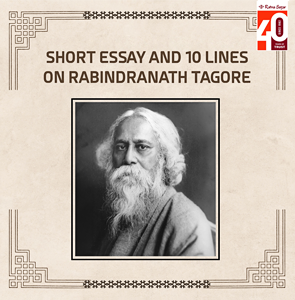Short Essay on Rabindranath Tagore
Rabindranath Tagore, often referred to as the Bard of Bengal, was a polymath whose influence spread beyond borders and generations. Tagore was born on May 7, 1861, in Kolkata. He was a poet, philosopher, musician and artist.
Tagore’s literary journey began at an early age under the guidance of his father, Debendranath Tagore who was a prominent figure in the Bengali Renaissance. Rabindranath Tagore produced great works like “Gitanjali,” a collection of deeply spiritual and lyrical poems. Gitanjali earned him the Nobel Prize in Literature in 1913, and made him the first non-European to receive such an honour.

Beyond poetry, Tagore was a visionary educator who founded Santiniketan. His Shantiniketan later evolved into Visva-Bharati University. It emphasises holistic education and the integration of arts, culture and nature. His philosophy of education emphasised individual freedom, creativity and harmony with the environment.
Tagore’s contributions extended to various artistic realms. He composed thousands of songs, which are an integral part of Bengali culture and are celebrated annually during Rabindra Sangeet festivals. His paintings, though lesser-known, reflect his deep connection with nature and spirituality.
Tagore was a believer in humanism and universalism and vehemently opposed imperialism. He renounced his knighthood in protest against the Jallianwala Bagh massacre in 1919.

Tagore’s impact is felt globally. His works have been translated into numerous languages, fostering cross-border dialogue and appreciation. He is known to have inspired luminaries like Albert Einstein, who described him as a “reincarnation of the Renaissance Man.”
Even after his passing in 1941, Tagore’s legacy endures, resonating with generations seeking spiritual enlightenment, artistic expression, and social reform.
10 Lines on Rabindranath Tagore
1. Rabindranath Tagore, known as the Bard of Bengal, was born on 7 May 1861, in Kolkata.
2. He was a versatile polymath, excelling as a poet, philosopher, musician, and artist.
3. Tagore’s literary journey began under the guidance of his father, Debendranath Tagore, a prominent figure in the Bengali Renaissance.
4. His notable work “Gitanjali” earned him the Nobel Prize in Literature in 1913, making him the first non-European to receive such recognition.
5. Tagore founded Shantiniketan, later evolving into Visva-Bharati University, emphasising holistic education and the integration of arts, culture, and nature.
6. He composed thousands of songs, integral to Bengali culture, celebrated during Rabindra Sangeet festivals.
7. Tagore’s paintings reflect his deep connection with nature and spirituality.
8. He was a staunch advocate of humanism and universalism, opposing imperialism.
9. Tagore’s works have been translated into numerous languages, fostering cross-border dialogue and appreciation.
10. His legacy endures, inspiring generations seeking spiritual enlightenment, artistic expression, and social reform.
Read More…
- Short Essay and 10 Lines on Satyajit Ray
- Short Essay and 10 Lines on Kasturba Gandhi
- Short Essay and 10 Lines on B.R. Ambedkar
- Short Essay and 10 Lines on Baisakhi
- Short Essay and 10 Lines on Jyotiba Phule

